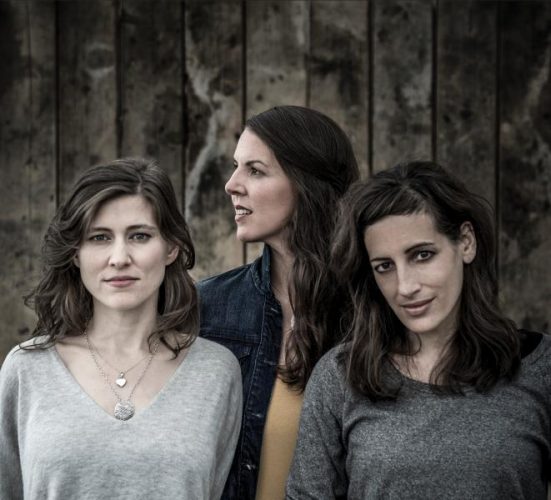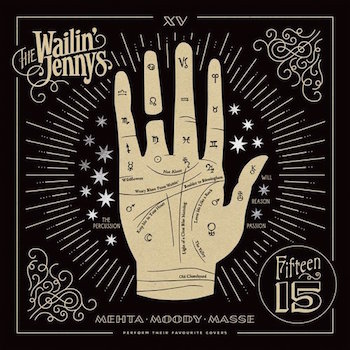Music Preview: The Wailin’ Jennys Return to Cambridge
“Our intention was something other than being famous. When you create art from that place, a song is going to connect with people.”

The Wailin’ Jennys. Photo: courtesy of the artists.
By Glenn Rifkin
The first time I heard the soaring three-part harmonies of the Wailin’ Jennys, at a Sunday evening show at Passim in 2006, I came away believing I had witnessed new stars being born. These three young women, multi-talented singer/songwriter/musicians from Winnipeg, Manitoba, had clearly tapped into a melodious magic that is rare but unmistakable, a hard-to-resist fusion of fresh folk-roots, bluegrass, and Celtic.
Ruth Moody, Nicky Mehta, and Annabelle Chvostek recorded two remarkable CDs — 40 Days and Firecracker (Red House Records) — that solidified their standing with a growing and infatuated fan base as they toured small venues, the Somerville Theatre among them. Then they became regular guests on Garrison Keillor’s Prairie Home Companion and their popularity grew. Ten years ago, Heather Masse, a tall, talented singer/songwriter from New York, replaced Chvostek.
Sure, the name, given to them by a guitar shop owner in Winnipeg, seemed silly and a bit odd. They had no connection to the late country star, but the name stuck. As all three women became mothers, their touring became more intermittent. While Mehta remains in Winnipeg, Moody moved to Nashville, and Masse resides in the Catskills, and they found little time to get into the studio to record. They didn’t follow up their 2011 Bright Morning Star CD until last fall, with the release of Fifteen, a set of covers that includes songs from Tom Petty, Emmylou Harris, Paul Simon, and Dolly Parton.
Their latest album was done on the fly because Massie and Mehta could not be away from their children for longer than a week. They only had five days to record. “We decided to do something that was true to our live show,” Moody said. “Arranging other people’s songs has been something we’ve enjoyed doing since the beginning, so we thought that a covers album would be fun to do, especially given the time restraints.” The result is a worthy addition to the group’s discography, particularly their enchanting cover of Petty’s “Wildflowers.”
The Jennys are back in Cambridge — at Harvard University’s Sanders Theater — this Thursday evening, August 23. I spoke to Nicky Mehta about the upcoming show, the Jennys’ music, and that search for the elusive work/life balance.
Arts Fuse:Your sound has been consistent and remarkably enduring. What is the root of that?
Nicky Mehta: The thing that remains consistent throughout is the harmony. Anything we do carries that trademark. Even if we wander off stylistically with the music itself, the harmonies are identifiable for people. Especially since Heather has been with the band now over ten years. She was our third alto. But the fact that the band has always been made up of Ruth and I, there’s a consistency there.
AF: Those harmonies seem effortless but it is has to be difficult to sustain that level of quality.
Mehta: It’s not really. The big thing, which is out of our control, is the blend. If you don’t have the blend, you don’t have anything. You may create harmonies that sound nice but if the voices really match and blend with each other and create a seamless whole, that’s a big part of it. That’s why the best harmonies you can think of are siblings, family members. We just got lucky that the blend was there for the three of us. Also, we’ve all grown up singing harmonies from when we were very young. Heather and Ruth were trained; they can parse what is happening in the arrangement. I don’t have that background so mine is all ear and instinct. I’ve been singing harmony since I was 4 years old. I never sing melody to a song. I always sing harmony. I will hear a song that I haven’t heard since I was little, I was listening to Elton John for example, and I’ll hear it, and realize I was harmonizing even back then.
When we arrange songs, there is some time spent trying to figure out the harmonies, but that comes just from trying it together. We’re so used to it. We’ve been doing it for so long.
AF: Who were your musical influences?
Mehta: We have a lot of influences in common but also a lot of individual differences. Emmylou Harris. Patty Griffin. Growing up in Canada, we listened to Neil Young and Joni Mitchell. We listened to John Prine. But we all come from different backgrounds. Ruth has a Celtic background, Heather is more of a jazz person, a Nina Simone, Ella fan. I come from the weirdest background, Britpop. I liked The Smiths, Queen, the Police.
AF: You live in different places, even countries. So how do you find time to rehearse?
Mehta: We don’t rehearse. (laughter) We don’t really. If we’ve been off the road for a while, for hiatus, when we get back together, we’ll spend a couple of days rehearsing. But I’ve been singing with Ruth for 16 years, and Heather for ten. It feels like it comes back very quickly. Like riding a bicycle. We’ve been on the road for the past two years, fairly consistently, mostly performing once a month. When you have that kind of schedule, you don’t have the need to rehearse, unless there’s a new song. Then we rehearse during the touring time frame.
AF: Since you began all this, you’ve all become mothers and have the classic work/life balance issues to grapple with. It’s hard for a lawyer or a business executive but it must be really tough for a touring band.
Mehta: I can only describe it as chaos all the time. That’s what it feels like. I have nine-year old twins. That alone feels like chaos. As they get older, certain things get easier, certain things are harder. Consistency is important with them but tricky to accomplish. When am I on the road, my husband, who does sound, film, live broadcasts, usually has 12 hour days, so he can’t really work a lot while I’m gone. It makes it tricky. I get home and he works. It’s just a lot of tradeoff. There’s a feeling of a whirlwind all the time. That’s the way it’s always been for us. I don’t know that anybody feels like they have a balance. It’s always a changing thing. You just go with it.
AF: You haven’t done Prairie Home Companion since Garrison Keillor left the show. How big was that gig for your success?
Mehta: That was one of the top two or three most important things that happened to the band, because it’s tricky for Canadian bands to break into the U.S. Not a lot do it very successfully. Prairie Home Companion was responsible for our fans in the States. We couldn’t make a living touring Canada alone. We’re in the States 98% of the time.

AF: You are very successful, but superstardom has been elusive. There are so many great and talented musicians with a loyal following but it’s a case of famous to a few. Are you comfortable with that? Do you want to make the leap to the next level?
Mehta: No. We never have wanted to get to that level. It might irritate people to hear us say that. I remember a long time ago, talking to our managers, back before Heather joined the band, and one of our managers said, `what level of success are you aiming for?’ We said `we don’t want to be the Dixie Chicks.’ We don’t want anywhere near that level of fame. Ever. Especially now. We’re quite happy doing what we’re doing at level we’re at. We don’t want to tour more than we tour. We have a really strong fan base and it grows on its own. I don’t know why. It’s word of mouth. People hear the music but we’re not super aggressive about marketing. We’ve got a level of success that works well for us. We are not aiming to be bigger than we are. We can’t accommodate that next level anyway. It seems silly to try to get a bigger name and then not be able to do anything to go along with that. We’re happy with the audience we have right now.
AF:You are making a living, but is it lucrative? It has to be the touring.
Mehta: We used to do very well with CD sales. But that is definitely going down, Our audience is great, a lot do buy physical copies. It’s rare to have an audience like that. But it is about touring. Nobody is making a killing off this band, it’s nobody’s full-time job. We do reasonably well. Ruth has a solo career. Heather has other music stuff on the side. I have other music stuff and other work that is not musically related. You piece it all together. If we wanted this to be only source of income, we’d have to be touring more.
AF: Yet you seem to retain a high level of loyalty with your audience.
Mehta: Our audiences grow very organically. When we ask people if they’ve seen us before, the audience is half and half. We’re wondering where these new people are still coming from because there is no aggressive marketing campaign. It surprises us.
AF: One thing that’s indisputable is the emotional connection people have to your music. That is a tough thing to achieve.
Mehta: I think it has everything to do with intention. All three of us decided that we wanted our music to make an impact on people’s hearts. We wanted to make art that would make people feel better. That was something I decided before I started playing music. I wanted to be a light to people and make connections. Heather was going to be a music therapist. Our intention was something other than being famous. When you create art from that place, a song is going to connect with people.
Glenn Rifkin is a veteran journalist and author who has covered business for many publications including The New York Times for nearly 30 years. He has written about music, film, theater, food and books for The Arts Fuse. His new book Future Forward: Leadership Lessons from Patrick McGovern, the Visionary Who Circled the Globe and Built a Technology Media Empire will be published by McGraw-Hill in September.
Tagged: Annabelle Chvostek, Glenn Rifkin, Nicky Mehta, Red House Records, Ruth Moody
